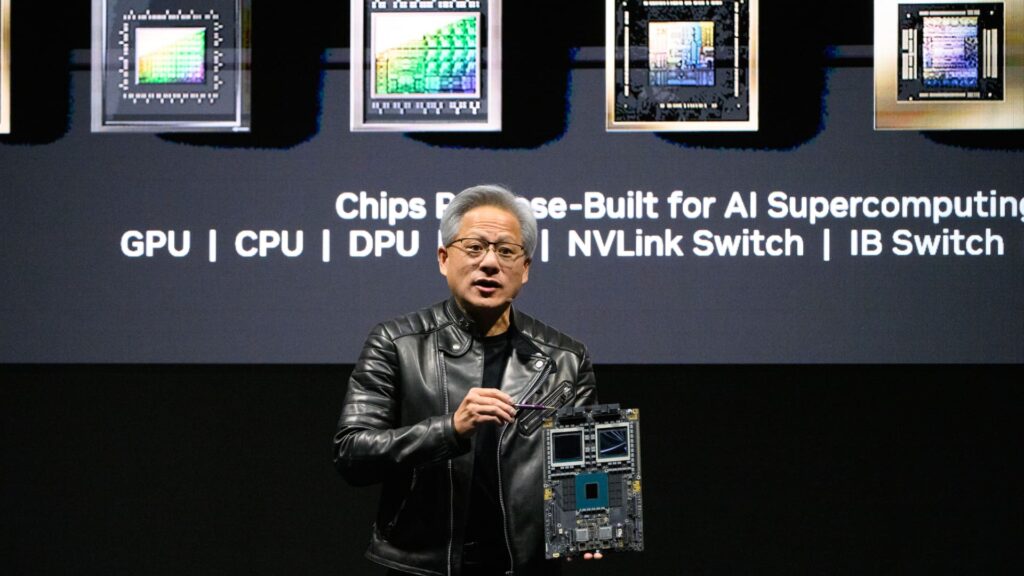Jensen Huang, co-founder and chief executive officer of Nvidia Corp., holds up the company’s AI accelerator chips for data centers as he speaks during the Nvidia AI Summit Japan in Tokyo, Japan, on Wednesday, Nov. 13, 2024.
Akio Kon | Bloomberg | Getty Images
This report is from today’s CNBC Daily Open, our international markets newsletter. CNBC Daily Open brings investors up to speed on everything they need to know, no matter where they are. Like what you see? You can subscribe here.
What you need to know today
Nvidia beats expectations, but shares slip
Nvidia third-quarter earnings beat expectations, but shares dropped 2.5% in extended trading. The company’s revenue surged 94% year on year to $35.08 billion in the quarter ended Oct. 27. Net income rocketed 109% from a year ago to $19.3 billion. Demand for Nvidia’s next-generation chip Blackwell “is expected to exceed supply for several quarters in fiscal 2026,” said Nvidia CFO Colette.
Adani charged in New York with fraud
Indian billionaire Gautam Adani, chair of India’s Adani Group, was indicted with others in New York federal court on charges related to a bribery and fraud scheme, authorities said Wednesday. Adani and other defendants are accused in the indictment of having paid Indian government officials more than $250 million in bribes to obtain solar energy supply contracts worth more than $2 billion in profits.
The Dow breaks losing streak
U.S. markets traded mixed on Wednesday ahead of Nvidia’s earnings after the bell. The S&P 500 was flat, the Dow Jones Industrial Average rose 0.32% to break its four-day losing streak and the Nasdaq Composite slipped 0.11%. Europe’s Stoxx 600 was little changed, with the European Central Bank warning the biggest economic threat to the euro zone was no longer high inflation, but weak growth.
UK inflation in October sharply higher
For the U.K. inflation still remains a tough nut to crack. On an annual basis, prices increased 2.3% in October, according to data from the British Office for National Statistics, sharply higher than September’s 1.7% rise. Economists polled by Reuters were expecting October’s figure to be 2.2%. The reading reduces the probability that the Bank of England will lower interest rates in December.
[PRO] 10-year Treasury yield might hinder stocks
The yield on the 10-year Treasury Note was at 4.402%, sharply higher than the 3.6% it hovered around in September. If the yield breaks the psychological level of 4.5%, strategists say it would weigh on the stock market.
The bottom line
There’s a concept in psychology called the “hedonic treadmill.” It theorizes that as people achieve success, their expectations rise alongside. As a result, people need an ever-increasing magnitude of improvement to feel the same degree of happiness they felt initially.
Nvidia seems a victim of this concept. The chipmaker didn’t disappoint in terms of third-quarter revenue and net income, compared with what analysts polled by LSEG had expected.
For the current quarter, analysts forecast $37.08 billion in current quarter sales. The chipmaker predicts it will beat that by around $400 million.
Despite that, Nvidia shares dropped around 2.5% in extended trading.
Investors are likely zooming in on the rate at which Nvidia is growing its numbers, compared with its past performance, not just whether it’s surpassing expectations.
Even though Nvidia’s third-quarter revenue soared 94% on an annual basis, it’s a slower pace than Nvidia’s growth in the previous three quarters, when sales rose 122%, 262%, and 265%, respectively, as CNBC’s Kif Leswing notes.
The same goes for Nvidia’s forward guidance: A growth of around 70% for current-quarter sales, compared with a year earlier. Take out the champagne? No. Investors think that warrants only some lukewarm beer, because it’s lower than third-quarter growth of 94%, and dramatically falls short of Nvidia’s 265% annual growth in the same period a year prior.
The fact that Nvidia’s shares slipped in extended trading after such a sterling report “tells you how much the expectations game on Nvidia has been ramped up,” Aswath Damodaran, finance professor at New York University’s Stern School of Business, told CNBC.
“They don’t just have to beat analyst estimates; they got to beat them by 10%.”
It appears that investors have enjoyed Nvidia’s astounding performance for so long they’ve become desensitized to it. Maybe it’s time to get off the treadmill?
— CNBC’s Kif Leswing, Samantha Subin and Brian Evans contributed to this report.

